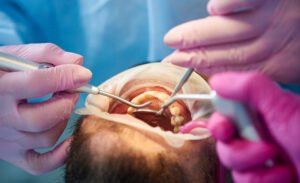Dental implants are a marvel of modern dentistry, offering functional and aesthetic benefits to those who opt for them. However, as with any surgical procedure, there can be post-operative discomfort. Dental implant pain is a common concern, but with the right strategies, it’s manageable.
The patients wearing dental implants can have pain, which is a common concern, but it can be effectively managed with the right strategies. Here, we will delve deep into some key tips on alleviating and managing dental implant pain, ensuring a smoother recovery journey.
How to Manage Dental Implant Pain
Tip #1. Understand the Source of the Dental Implant Pain
Before diving into management techniques, it’s essential to understand the root cause of the pain. When a dental implant is placed, it involves making an incision in the gum and drilling a small hole in the jawbone where the implant is anchored. As a result, dental implant pain post-surgery is usually due to the trauma caused to the soft and hard tissues. It’s a natural body response and indicates the beginning of the healing process.
Must Read: Understanding Oral Bacteria’s Role from a Dentist
Beyond the surgical trauma, the surrounding tissues undergo inflammation, a body’s standard procedure to ensure protection and kick-start recovery. This inflammation results in tenderness, swelling, and warmth in the affected area. Additionally, as the bone starts fusing with the implant – a process called osseointegration – minor sensations or discomfort might be felt.
Recognizing that these symptoms are part of the body’s way of adapting and healing can provide reassurance and clarity during the postoperative phase. With this understanding, patients can better cooperate with their oral care professionals and adhere to pain management strategies, knowing each step moves towards a successful implant outcome.
Tip #2. Cold Compresses
Cold compresses are one of the most straightforward and effective ways to manage dental implant pain. Applying a cold pack to the affected side of the face can significantly reduce swelling and provide immediate relief. Ensure you wrap the ice pack in a thin cloth to avoid frostbite. Use it in intervals — 20 minutes on and then 20 minutes off—during the first 48 hours after the surgery.
Read More: What is the Role of Thumb Sucking in Child’s Dental Development
The science behind it is simple: cold temperatures constrict blood vessels, reducing inflammation and numbing the area, thus alleviating dental implant pain. Additionally, cold compresses act as a distraction technique, shifting your brain’s focus from the sensation of pain to the sensation of cold. For those who prefer holistic pain management, cold compresses are an ideal, non-pharmaceutical method.
When using this approach, consistency is vital. It’s not just about the immediate relief after application, but the cumulative effect of regularly applied compresses can significantly speed up the healing process and reduce overall discomfort.
Tip #3. Stick to the Prescribed Medication
Your dentist will likely prescribe pain relievers to manage the dental implant pain. It’s crucial to take them as directed. Over-the-counter painkillers can also be effective, but consult your dentist before taking any medication to avoid interactions or overmedication.
Read More: 5 Potential Root Canal Complications and Solutions To Consider Before Treatment
Overlooking or altering your prescribed dosage can prolong dental implant pain and hinder optimal healing. Remember, your dentist prescribes a specific medication and dosage based on your individual needs and the procedure’s intricacies. It’s not just about managing pain—antibiotics might be given to prevent infection, while anti-inflammatory drugs can reduce swelling.
Always keep a schedule, adhere to recommended doses, and never hesitate to ask questions or report any unusual side effects to your dentist. Your path to a pain-free, successful implant largely depends on this step.
Tip #4. Maintain Oral Hygiene but Be Gentle
It might seem counterintuitive to clean around the surgical site, but maintaining oral hygiene can significantly reduce dental implant pain. Accumulation of bacteria and food debris can lead to infection exacerbating and pain. Rinse your mouth with warm salt water several times a day. It acts as a natural disinfectant and soothes the surgical area. However, be gentle while brushing and avoid direct contact with the implant site for the first few days.
Tip #5. Watch Your Diet
Eating soft foods can reduce the mechanical stress on the surgical site, thus minimizing dental implant pain. Foods like soups, yogurts, mashed potatoes, and smoothies are excellent choices. Also, avoid extremely hot or cold foods as they aggravate the pain. Spicy foods, acidic fruits, and foods with tiny seeds should be avoided as they can irritate the surgical site.
Must See: Why Teeth Cleanings Matter: Your Calgary Guide to Smile Health
a. Embrace Protein-Rich Soft Foods: While it’s essential to stick to soft foods, aim for those rich in protein. Scrambled eggs, cottage cheese, or tofu can be excellent choices. Proteins play a vital role in tissue repair and can aid in faster surgical site healing.
b. Stay Hydrated: Drink plenty of water to support overall health and detoxification. However, avoid using a straw for the first few days, as the suction can disturb the healing process and exacerbate dental implant pain.
c. Incorporate Anti-inflammatory Foods: Foods rich in omega-3 fatty acids, such as flaxseeds or chia seeds, can be incorporated into smoothies. These fatty acids have anti-inflammatory properties which can reduce swelling and pain around the implant area.
Tip #6. Avoid Strenuous Activity
Post-surgery, give yourself time to heal. Engaging in strenuous activities can increase blood pressure, leading to increased swelling and, subsequently, more dental implant pain. It’s best to rest and avoid any vigorous exercises for at least a couple of days after the procedure.
Must Read: 10 Everyday Oral Hygiene Tips For Better Health
a. Increased Blood Flow: Vigorous activities, whether it’s a hardcore gym session or heavy lifting, can accelerate your heart rate. This increases blood flow throughout the body, including the surgical site, potentially leading to exacerbated swelling.
b. Risk of Physical Injury: Activities that involve running, jumping, or swift movements increase the risk of accidental hits or bumps to your face. Even a minor knock can disturb the implant site, potentially leading to complications or prolonging the healing process.
c. Delayed Healing: Overexerting yourself can divert crucial nutrients and immune cells away from the healing site. When your body is focused on recovering from rigorous exercise, it might divert resources from the implant healing process, prolonging the duration of dental implant pain.
Tip #7. Regularly Consult with Your Dentist
Always keep an open line of communication with your dentist. While some degree of dental implant pain is expected after the procedure, any sudden spikes in pain or discomfort lasting more than a week should be discussed immediately.
Read More About: Say Goodbye to Bad Breath: 10 Effective Cures
Your dentist can provide insights, adjust medication, or suggest additional remedies to ensure the healing process is on track. Further, if you’re in the Calgary area, consider booking your follow-up appointments with Port Dental for dental implants in Calgary. Renowned for our comprehensive post-operative care, the experts at Port Dental in Calgary will provide a holistic approach to your healing.
The state-of-the-art facilities and experienced professionals ensure that your recovery from dental implant surgery is smooth and monitored with the utmost care.
Conclusion
The journey to a restored smile through dental implants is a transformative experience, but it comes with its fair share of challenges, most notably post-surgical discomfort. However, with informed strategies ranging from understanding the source of dental implant pain, employing cold compresses, following prescribed medications, maintaining delicate oral hygiene, adopting a strategic diet, keeping physical activity minimal, and proactively consulting with trusted dental professionals, managing this discomfort becomes achievable.
Must Read: Invisible Alignment: The Invisalign Revolution in Teeth Straightening
As highlighted, the role of consistent communication with your dentist, such as the renowned experts at The Port Dental in Calgary, cannot be understated. They are the guiding beacon, ensuring a smoother, more comfortable recovery journey. Always remember, while the initial pain and discomfort are temporary, the joy of a revitalized smile, with proper care, can last a lifetime.















